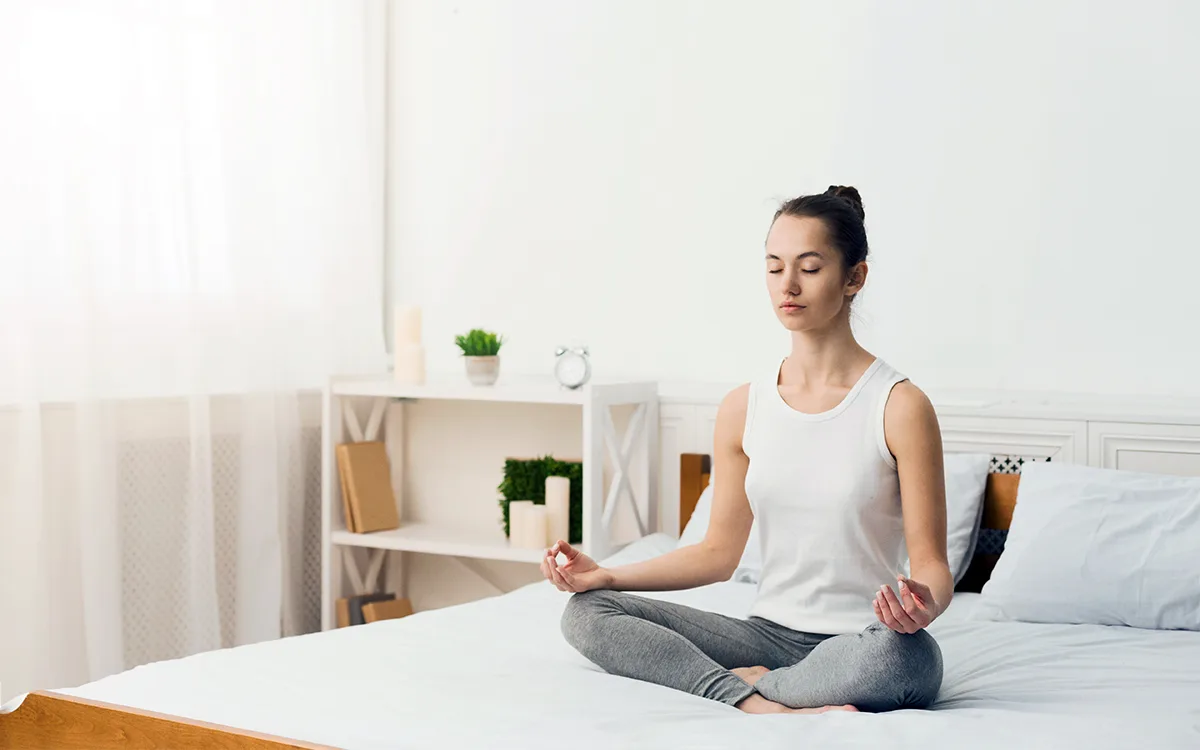Good sleep is one of the most important parts of a healthy life. Yet many people find it hard to fall asleep or stay asleep through the night. Busy thoughts, stress, or an unsettled routine often make it difficult to rest well. This is where sleep meditation can make a difference. Practicing meditation before bedtime helps quiet the mind, relax the body, and prepare you for restful sleep. In this blog, we will look at the benefits of sleep meditation and simple steps on how to do it, so you can create a calming nightly routine.
What is sleep meditation?
Sleep meditation is a relaxation technique that uses mindfulness and breathing practices to prepare your mind and body for rest. Unlike regular meditation done in the morning or daytime, sleep meditation is often practiced right before bed. It can involve guided audio, deep breaths, or gentle body-focused practices like progressive muscle relaxation. The goal is not to stay awake but to ease into a state where falling asleep feels natural and effortless.
What are the benefits of sleep meditation?
Practicing sleep meditation regularly offers many benefits for your nightly routine and overall wellness.
- Helps quiet the mind – Racing thoughts are a common reason people struggle at bedtime. Sleep meditation helps shift your focus to the present moment, letting go of worries about the past or future.
- Supports mind and body connection – Meditation practices like mindful breathing or guided sleep meditation help you tune into how your body feels, allowing stress to melt away gradually.
- Eases daily stress – Relaxation techniques used in meditation can help ease the tension built up during the day. This sense of calm prepares the body for rest.
- Encourages healthy sleep habits – By pairing meditation with your nightly routine, your body begins to associate these steps with bedtime, making it easier to fall asleep naturally.
- Creates a balanced sleep environment – Practicing meditation makes you more aware of your surroundings, encouraging small changes like keeping your room cool, dark, and quiet to support restful sleep.
How to do sleep meditation step by step?
You do not need special tools or experience to begin sleep meditation. Here is a simple process you can follow:
- Set your space – Make your sleep environment comfortable. Keep your room cool, dark, and quiet. You may also dim the lights or use calming scents like lavender if you enjoy them.
- Lie down or sit comfortably – Choose a position where you feel fully at ease. Most people prefer lying down, but sitting upright can also work if you tend to fall asleep too quickly during practice.
- Take deep breaths – Start with slow, deep breaths. Inhale through the nose, hold for a moment, and exhale gently through the mouth. Breathing this way helps signal your body to relax.
- Progressive muscle relaxation – Slowly bring attention to different parts of your body, starting from your feet up to your head. Gently tighten and then release each muscle group. This helps ease any physical tension.
- Focus on the present moment – If your mind wanders, gently guide it back to your breath or the sensations in your body. The idea is not to stop thoughts completely but to let them pass without holding on.
- Use guided sleep meditation – If you are new, try listening to an audio meditation or app designed for sleep. A calm voice can guide you through breathing, body scans, or visualization exercises that lead you into rest.
Pro Tip: Follow this night time routine –
Sleep meditation works best when it becomes part of your routine. Here are simple tips to include it every night:
- Choose a consistent time – Going to bed at the same time daily helps your body get used to a rhythm.
- Limit screens before bed – Turn off phones, TVs, or laptops at least 30 minutes before you begin meditation.
- Create calming signals – Reading, stretching, or drinking a warm non-caffeinated tea before meditation can act as signals that bedtime is near.
- Keep it short at first – Begin with 5–10 minutes of meditation and slowly extend the time as you feel comfortable.
- Consider gentle supplementation – For some, adding natural support like a magnesium glycinate supplement may help maintain relaxation as part of their sleep habits.
How does sleep meditation fit into overall wellness?
Sleep meditation is more than just a bedtime trick; it is a practice that helps balance your daily life. By focusing on the present moment and creating a sense of calm, it encourages better self-awareness. Pairing meditation techniques with a supportive sleep environment and consistent nightly routine can help restore your natural ability to rest. Over time, this contributes to both mental and physical wellness, helping you wake up refreshed for the day ahead.
Conclusion
Struggling to fall asleep or stay asleep is common, but small changes can make a big difference. Practicing sleep meditation is a simple way to quiet the mind, relax the body, and create healthy sleep habits. By focusing on deep breaths, relaxation techniques, and guided practices, you can prepare yourself for restful nights. Whether you begin with just a few minutes or add it into a longer nightly routine, sleep meditation can be a natural step toward better rest and overall balance in your life.
Check Out This Blog: Finding the Right Magnesium Supplement for You

